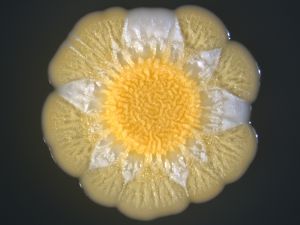It has long been thought that bacteria are relatively simple organisms that generate complicated infections by greatly increasing their numbers, which prevents their complete eradication by antibiotics. A study led by researchers from the Spanish National Research Council (CSIC) has now shown that bacteria from an infection do not spread in a disorderly way but proliferate in an organized manner, with assignment of tasks among bacteria within the same community: some secrete toxins, others adhere to organs, while others combat the immune system, and so on. This finding, published in the journal eLife, could be used to develop therapies for difficult-to-treat infections or to predict the behavior of countries in stressful situations.
"In such a community, all bacteria are genetically the same, but some subpopulations express their genes differently; this leads to their specialization to carry out a specific task," explains study director Daniel López, a researcher at the Centro Nacional de Biotecnología (CNB-CSIC). "This study shows that infections by the pathogen Staphylococcus aureus organize bacterial subpopulations specialized in breaking down tissues, others secrete toxins or adhere to organs, while yet others confront the immune system... All coordinated with each other to generate a successful infection, as if they were "microbial cities" with a division of labor; doctors, lawyers, policemen, shopkeepers, plumbers. All are professions important to maintaining a balance and making a progressive, productive comunity," López says.
Research found that some subpopulations are more important than others, depending on the type of infection. It is not always the same subpopulation that is relevant, but depends on the infection. "Bacteria specialized in fighting the immune system are essential during chronic infections, whereas those that secrete toxins are essential for developing acute infections; just as in wartime, the military is essential for community survival, or health personnel during an epidemic," Lopez explains.
With this knowledge, therapies can be generated for difficult-to-treat infections, to eliminate only the subpopulation that sustains the infection and thus to end it entirely, just as a community without an army has no chance of surviving a military conflict, indicates López. Other applications of this bacterial proliferation model are being considered; for example, to predict behavior of countries faced with stressful situations, from an economic crisis to an earthquake.
- Source CSIC
- Juan-Carlos Garcia-Betancur, Ángel Goñi-Moreno, Thomas Horger, Melanie Schott, Malvika Sharan, Julian Eikmeir, Barbara Wohlmuth, Alma Zernecke, Knut Ohlsen, Christina Kuttler and Daniel Lopez. Cell Differentiation Defines Acute and Chronic Infection Cell Types in Staphylococcus aureus. eLife. DOI: 10.7554/eLife.28023.001






